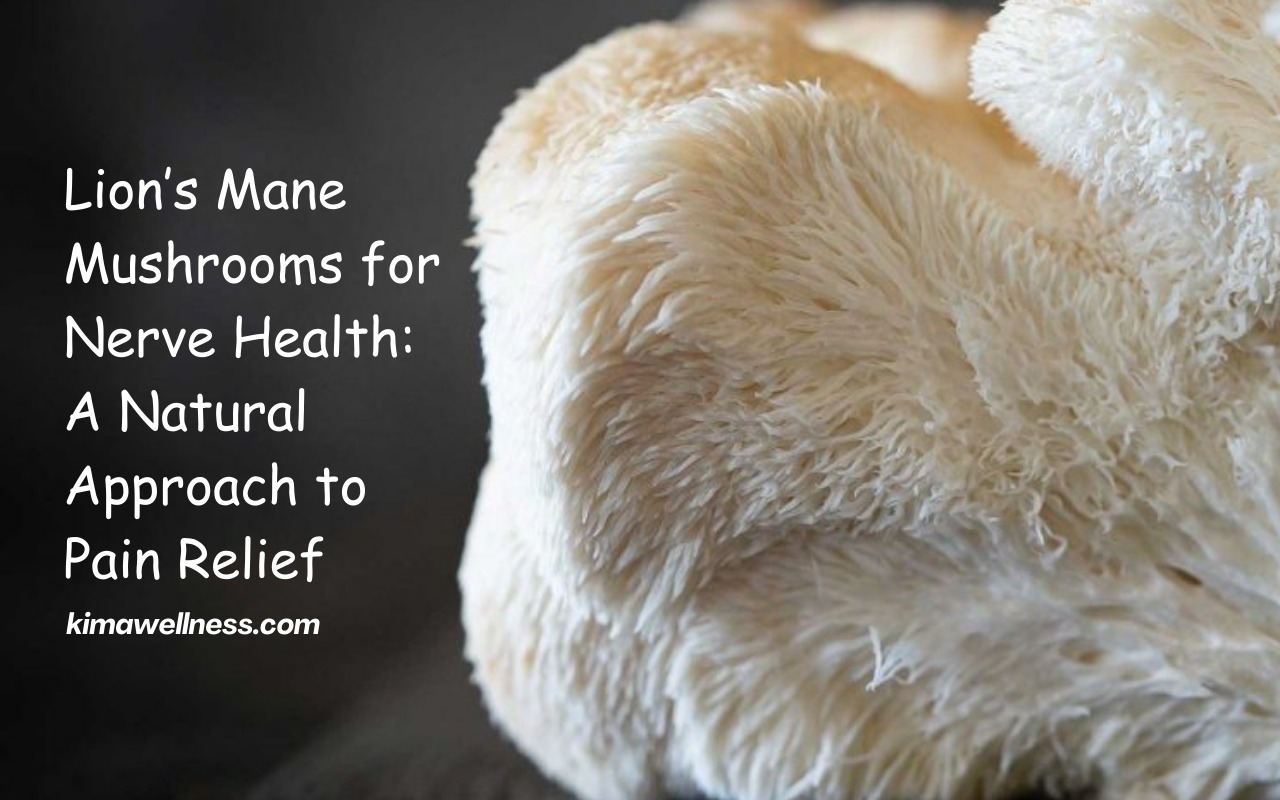
At KIMAWellness.com, our mission is to provide evidence-based, holistic solutions for pain management and wellness. One natural remedy gaining recognition in the field of nerve health and chronic pain relief is lion’s mane mushroom (Hericium erinaceus). This unique functional mushroom has been used for centuries in traditional medicine, and modern research is now highlighting its potential to support nerve regeneration, reduce inflammation, and alleviate pain caused by nerve damage.
Nerve pain, or neuropathy, can be debilitating, affecting mobility, daily function, and overall well-being. Whether caused by injury, diabetes, post-surgical complications, or conditions like multiple sclerosis, nerve-related pain often requires long-term management. Lion’s mane offers a natural, non-invasive approach that may help reduce discomfort and promote nerve healing.
How Lion’s Mane Supports Nerve Health and Pain Relief
Lion’s mane mushrooms contain bioactive compounds, including hericenones and erinacines, which have been shown to stimulate nerve growth factor (NGF) production. NGF is essential for the repair, protection, and regeneration of nerve cells, making lion’s mane a promising option for those struggling with chronic nerve pain and neurodegenerative conditions.
1. Promotes Nerve Regeneration and Repair
Nerve damage can take months or even years to heal, depending on severity. Unlike conventional pain medications that only mask symptoms, lion’s mane may support actual nerve regeneration by:
- Stimulating NGF production, which promotes nerve healing and regeneration.
- Encouraging myelin sheath repair, the protective coating around nerves that ensures proper nerve signal transmission.
- Enhancing neuroplasticity, helping nerves adapt and repair after injury or chronic damage.
In animal studies, lion’s mane has been shown to accelerate recovery from nerve injuries, making it a potential complementary therapy for those recovering from sciatica, spinal injuries, or post-surgical nerve damage.
2. Reduces Inflammation and Oxidative Stress
Chronic pain is often linked to inflammation and oxidative stress, which can further damage nerves and tissues. Lion’s mane has natural anti-inflammatory and antioxidant properties that may help:
- Reduce nerve inflammation, alleviating pain and discomfort.
- Protect against oxidative damage, slowing nerve degeneration.
- Support overall immune function, which plays a role in the body’s ability to repair and recover from injury.
For individuals with conditions like diabetic neuropathy or autoimmune nerve disorders, lion’s mane may help reduce the inflammatory response contributing to pain and nerve dysfunction.
3. Supports Peripheral Neuropathy and Chronic Pain Conditions
Peripheral neuropathy affects millions of people, often causing burning, tingling, and numbness in the hands, feet, and extremities. Lion’s mane may help manage symptoms by:
- Improving nerve function and sensitivity in damaged areas.
- Reducing discomfort from nerve compression or irritation, such as in carpal tunnel syndrome or herniated discs.
- Regulating nerve signaling, potentially reducing hypersensitivity to pain stimuli.
While more human research is needed, preliminary studies suggest that lion’s mane could be a valuable addition to pain management strategies for neuropathy and nerve-related conditions.
4. May Aid in Recovery from Neurological Conditions
Lion’s mane is also being studied for its role in neurological disorders that impact nerve function and motor control. Some research suggests that it may help with:
- Multiple sclerosis (MS): By reducing inflammation and supporting myelin repair, lion’s mane could play a role in managing MS-related nerve damage.
- Parkinson’s disease: Some early studies suggest lion’s mane may protect against neurodegeneration, slowing disease progression.
- Post-stroke recovery: Animal studies indicate that lion’s mane may help regenerate brain cells and improve motor function following a stroke.
While not a substitute for conventional treatments, lion’s mane could serve as a supportive therapy in a comprehensive rehabilitation and pain management plan.
How to Use Lion’s Mane for Pain Relief and Nerve Health
Lion’s mane is available in several forms, allowing for flexible integration into a wellness routine:
- Capsules or Tablets: Convenient for daily supplementation.
- Powdered Extract: Can be mixed into smoothies, coffee, or tea.
- Tinctures: Liquid extracts for quick absorption.
- Fresh or Cooked Mushrooms: Can be incorporated into meals for a functional food approach.
Recommended Dosage for Pain and Nerve Health
While there is no standardized dosage, studies have used the following amounts for nerve health and pain relief:
- 500 mg – 1.5 g per day for cognitive and nervous system support.
- 1 g – 3 g per day for anti-inflammatory effects and neuroprotection.
- Up to 2 g per day for chronic nerve pain and recovery support.
When choosing a lion’s mane supplement, look for organic, third-party-tested products to ensure purity and potency.
Are There Any Side Effects?
Lion’s mane is generally well-tolerated, but some individuals may experience:
- Mild digestive discomfort (such as bloating or nausea).
- Increased nerve sensitivity, especially in those with severe neuropathy.
- Allergic reactions, particularly for individuals sensitive to mushrooms.
If you are taking blood-thinning medications or have an autoimmune condition, consult a healthcare provider before using lion’s mane.
Integrating Lion’s Mane into a Pain Management Plan
Lion’s mane is not a standalone treatment but can be a valuable part of a comprehensive pain management plan. To maximize its benefits:
1️⃣ Combine with Physical Therapy: Movement-based therapy helps reinforce nerve recovery and reduce stiffness. 2️⃣ Support with Anti-Inflammatory Nutrition: A diet rich in omega-3s, antioxidants, and whole foods enhances healing. 3️⃣ Use with Other Natural Pain Management Techniques: Acupuncture, massage, and myofascial release can complement lion’s mane’s benefits. 4️⃣ Prioritize Rest and Recovery: Allowing the nervous system to heal is key to long-term pain reduction.
Conclusion: Can Lion’s Mane Help with Chronic Pain and Nerve Damage?
While more human clinical trials are needed, existing research suggests that lion’s mane may support nerve regeneration, reduce inflammation, and improve pain management in those dealing with neuropathy, nerve injuries, and chronic inflammatory conditions.
At KIMAWellness.com, we advocate for natural, evidence-based solutions in pain management and rehabilitation. If you are dealing with nerve pain or chronic inflammation, talk to a specialist about incorporating lion’s mane into a holistic recovery strategy that aligns with your unique needs.
A well-rounded approach—including targeted therapy, nutrition, and natural supplementation—can help you regain mobility, function, and quality of life.